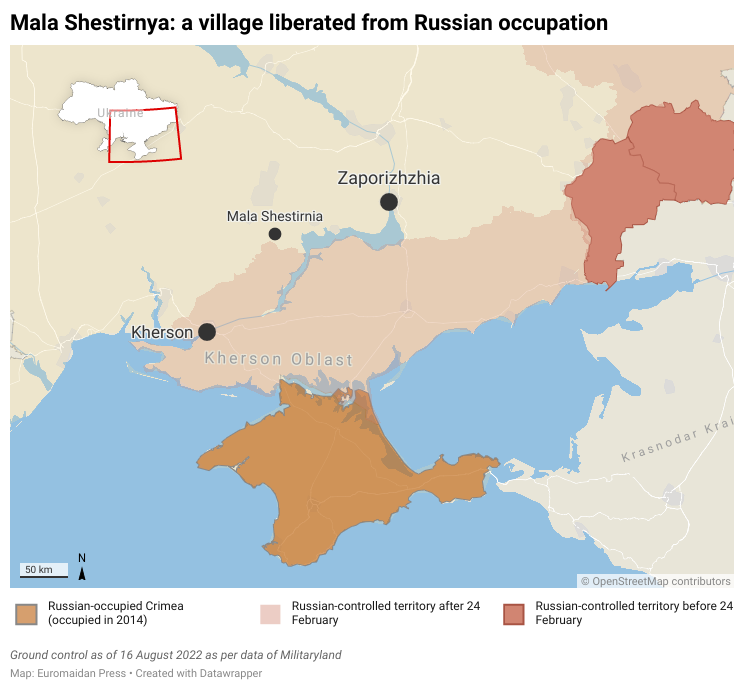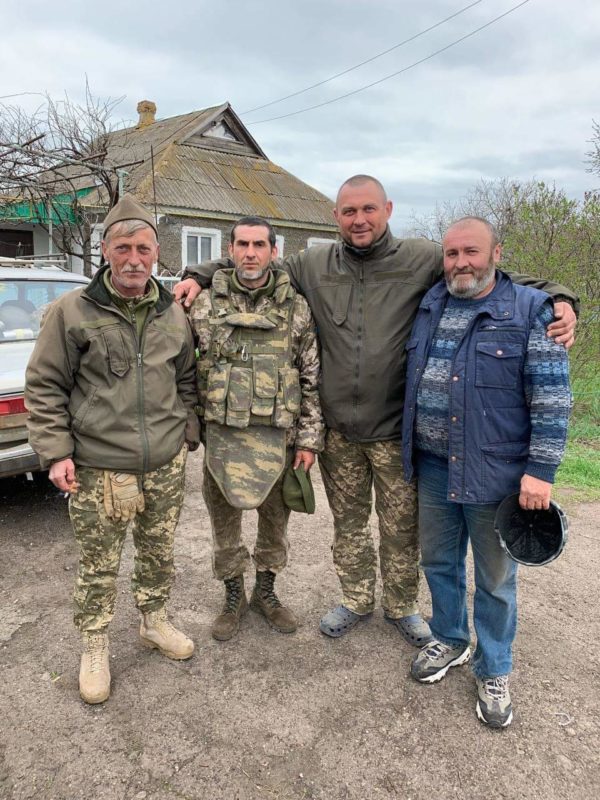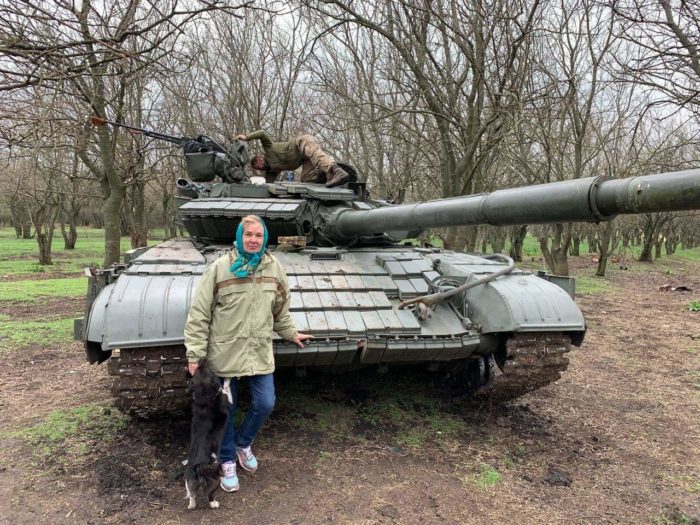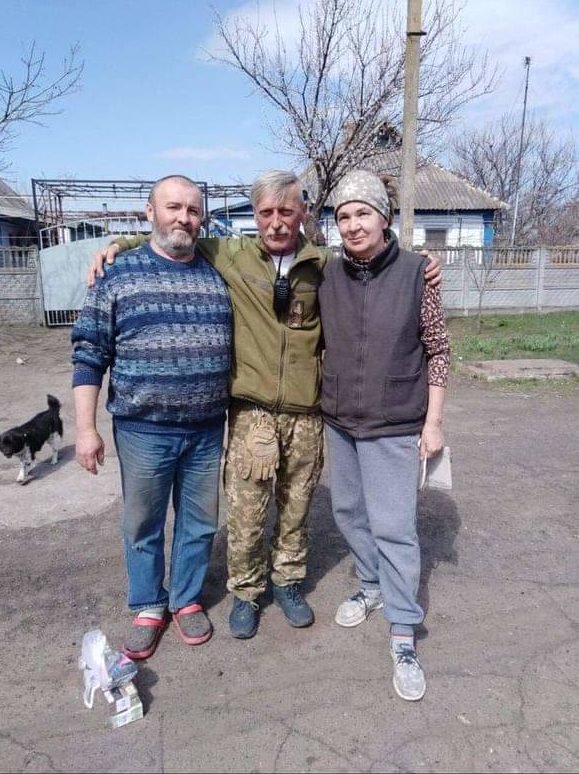Chased by Russian bombs
I left early in the morning to visit the village. On my way, I stopped to see Ihor, a local who agreed to assist me in the area. At present, getting into Mala Shesternia village is extremely difficult because the main roads are mined, and Russian artillery is constantly shelling the village, so Ukrainian soldiers are hesitant to let civilians in.

I got lucky having Ihor as my guide, as he knew alternate routes to the village through fields. We could barely see any civilian cars as military vehicles approached us. The closer we got to the village, the fewer cars we saw.
We turned off the asphalt road and into the field, winding our way through country lanes to the village. It was hard to miss the burnt fields and the scattered remains of Russian rockets. We proceeded with caution, but suddenly, I heard an explosion, and we saw a wave of dust rising around 300 meters away. Ihor and I exchanged a quick glance.
We were the only ones here, in the middle of nowhere. Then, not too long after the first explosion, we heard another one. Then there was another and another… And another.
Ihor stepped on the gas and drove as fast as possible, reaching top speed. It felt like Russian missiles were chasing us, falling right behind us and getting closer with each attempt.
Ihor laughed nervously and said: "Don't worry, we are not their target. Russians are shooting at random because they haven't precise coordinates of Ukrainian targets due to a lack of information-gathering drones. Plus, our Ukrainian artillerists are constantly on the move, making it much harder to get a hit."
After a few minutes, Ukrainian artillery let out a roaring round of fire in, what seemed, all directions. The road to the village was littered with debris, and Ihor was desperately playing a balancing act between speed and caution as he drove me to the Mala Shesternia.
Suddenly, Ihor turns to me and says: "I recall when Buryats brought me to my knees and, by threatening me with execution, they forced me to give up the deployment locations of the Ukrainian army. Every time I think about it, my heart starts racing."
His voice was trembling. For some time, we were driving in silence. Then Ihor took a deep breath and continued.
"One day in the middle of March, my wife Alla and I heard the hum of cars. We looked out the window and noticed several soldiers in our yard. They turned out to be Ukrainians preparing for the village's active defense. Russians had already occupied the entire Kherson Oblast, south Ukraine, and were preparing for the Kryvyi Rih offensive at the time.
They were few of them, but they were pretty determined. These soldiers took up residence at our home. We assisted them in any way we could, including providing a generator, instruments, and even a car.
The Russians were advancing on the village with large forces from all directions. Ukrainians were forced to retreat, carrying heavy losses. Many young men were killed. That is when the true horror began.
Russians arrived in the village and immediately went door to door to check on people's houses. That's how they found us. But, thank God, we were able to conceal everything from the Ukrainian soldiers.
I thought the Buryats would kill me right away. But, it turned out they had more pressing matters to attend to... like getting drunk. Their friends brought alcohol, and they all vanished.
Later, we found out that on the neighboring street, Russians kicked people who had nothing but their homes out on the streets, settling there and forcing those thrown out like stray dogs to live in a freezing, hungry basements.
Russians took their food, leaving locals with no choice but to beg for food from neighbors. 'LDNR' soldiers came up to them and said, 'It is now your turn to suffer.'"
We came across a burnt Russian IFV at the entrance to Mala Shesternia. It had completely burned out. Ihor offered me to stop by at his place. As we got closer to his house, the amount of destroyed buildings increased and countless amounts of scrawny homeless dogs were wandering around looking for whatever scraps they could find.
As we got out of the car, right next to Ihor's house, another huge explosion went off. The ground was trembling. The Russians were shelling the forest, which was 500-600 meters from the street we were on.

When we arrived, Ukrainian soldiers were huddled together, eating breakfast. They greeted us warmly. The soldiers and I traded gifts: a carton of Lucky Strike cigarettes for a bite to eat. These guys ended up, later on that day, liberating the nearby village of Ivanivka.
Meet the Ukrainian university professor who gives lectures from the trenches
Among the military personnel was a Mariupol resident who joined the Ukrainian army shortly after Russia declared war. He told us that he found many of their trunks and backpacks when they destroyed the Russian positions in Ivanivka. They were not laden with ammunition, but with looted goods. Toolkits, fishing rods, tablewar
e, and so on...
"So we will fight until a country is free from this trash. I'm not going to call them an army. They are criminals and looters," stated a military official from Mariupol.
Several more explosions rang out in the air and the soliders told us to take shelter behind the barn. When I arrived, I noticed locals from the neighborhood digging in their garden. It was incredible, their stoicism. Even in such dangerous conditions, people were working in the gardens, growing vegetables. During the artillery attack, soldiers repeatedly asked them to hide in the basement, but they stubbornly continued to work.
We went to Liudmyla's house; she is a local. Since her husband Ruslan was bedridden, she was forced to stay in Mala Shesternia.
"The explosions are second nature to us now, so, thankfully, I now fall asleep much quicker. I have become somewhat of an expert on missiles, to the point where I can identify the type of missile being used based on how it whistles during flight." Liudmyla told.
A herd of cows stood in a field in front of the village. It turned out that these cows had wandered down here after surviving the destruction of the neighboring villages (Topolyne and Knyazivka) by Russian attacks.
Growing partisan movement of Kherson Oblast now bombs collaborators
Demoralizing Russians with pinpoint strikes
On the night of 26-27 July, the Armed Forces of Ukraine launched a strike at the Antonivskyi bridge in the occupied Kherson Oblast using an American High Mobility Artillery Rocket System (HIMARS). It was to undermine the Russian army's military logistics, specifically to prevent military armored vehicles from crossing the Road Bridge from Crimea.
The strike on the Antonivsky Bridge demonstrated that Ukraine's Armed Forces maintain fire control over all communications, including those in the occupied area.It is not always about quantity. Quality matters too
Contrary to repeated assertions, the Russian army has nothing in its arsenal to oppose Western weapon models other than a large number of obsolete weapons. It is not always about quantity. Quality matters too.
The blow was delivered with pinpoint accuracy. The bridge was not destroyed, but rather damaged and closed to traffic. Unlike its Soviet MLRS counterparts, HIMARS does not inflict senseless destruction, but instead targets specific targets point by point.
Interview: What’s going on in the White House? Why won’t Biden hand over long-range HIMARS?
The strike on the Antonivskyi bridge severely demoralized Russian troops stationed in Kherson. Ukraine's Armed Forces seek to exhaust the Russian army as much as possible, depriving it of supplies and military transfers.
In contrast to the Russian military, the Ukrainian army values each soldier's life and strives to avoid unnecessary casualties. The strike on the bridge is a prelude to the liberation of the south of Ukraine, the Kherson Oblast, and these strikes are some of the necessary prerequisites.
The most important task is to save the city and avoid repeating the what happened in Mariupol. The Ukrainian army employs flexible and manoeuvrable tactics, whereas the Russian army has yet to shed its Soviet legacy.
In the event of a large-scale offensive by Ukraine's Armed Forces, Russian artillery will position itself within the urban area of Kherson, using ordinary civilians as human shields. It is their go-to strategy.
Russia’s nightmare comes true. HIMARS altering the course of the war in Ukraine, but for how long?
Kherson Oblast's industrial and port infrastructure, as well as its agricultural potential, are critical for Ukraine, meaning its liberation essential. In doing so, it will demolish the enemy's plans to occupy Ukraine's south, denying Russia access to the Black Sea, and will cut off the currently occupied Crimea, causing a logistical nightmare for Russia's in Donbas.
Read more:
- 70% of Chernihiv destroyed as Russian troops retreat & civilians leave bomb shelters
- Russia’s war crimes in Chernihiv Oblast: “They were beaten, tortured & executed…”
- Interview: What’s going on in the White House? Why won’t Biden hand over long-range HIMARS?
- Two new powerful explosions hit Russia-occupied Crimea: an ammunition depot & airbase detonate
- Russia’s nightmare comes true. HIMARS altering the course of the war in Ukraine, but for how long?
- Growing partisan movement of Kherson Oblast now bombs collaborators
- On the verge of despair yet waiting for liberation: life in Kherson after Russian occupation – report
- Two top Russian collaborators out in occupied Kherson Oblast after shooting and poisoning


